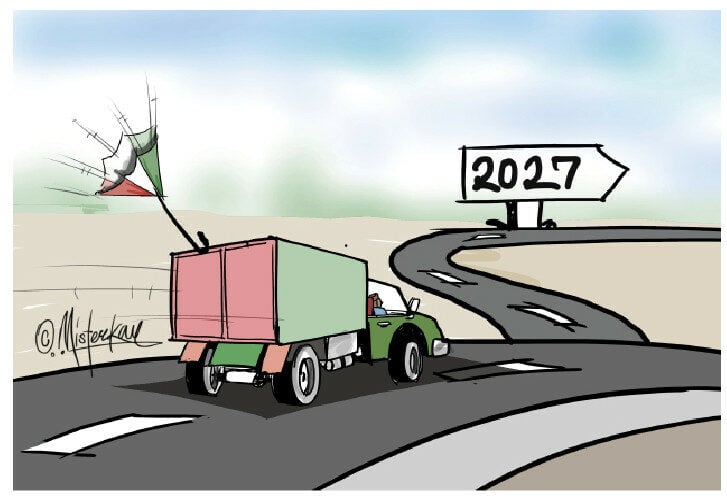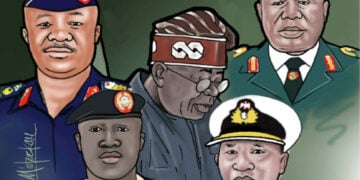The opposition Peoples Democratic Party (PDP) is making renewed efforts to show that it remains alive and poised to challenge the ruling All Progressives Congress (APC) in the 2027 general elections. At a recent meeting of the party’s governors’ forum in Zamfara State and the National Executive Council (NEC) held in Abuja, the party reechoed its resolve to rescue the nation from APC.
From these meetings emerged some far-reaching resolutions, most notably the zoning of the party’s presidential ticket to the South, which PDP leaders argue is part of a grand strategy to reposition the party.
However, the critical questions remain: has the PDP rescued itself from the internal squabble that reduced it from the main opposition party to a mere roadside gathering of strange political bedfellows? Is the PDP truly serious about reclaiming power? Can Nigerians, frustrated with the current economic realities, trust the PDP to provide the much-needed change? Is Wadata Plaza ready to deliver that change?
Memory Lane
PDP’s contributions to Nigeria’s political and economic development are difficult to dismiss. As the dominant party since the return to democracy in 1999, it helped consolidate democratic institutions, ensured peaceful transitions of power, and promoted relative political stability in its early years.
The party also spearheaded economic reform programmes, including the National Economic Empowerment and Development Strategy (NEEDS) and Vision 20:2020, which aimed to promote growth and modernisation. Significant investments were made in infrastructure, including roads, power generation, and telecommunications.
As the party in government, the PDP established institutions like the Economic and Financial Crimes Commission (EFCC), the Independent Corrupt Practices Commission (ICPC), the Budget Monitoring and Price Intelligence Unit (Due Process), the Sovereign Wealth Fund, and the Development Bank.
When the PDP assumed power in 1999, Nigeria’s economy was worth $57.48 billion, ranking 51st globally by GDP. By 2006, it had grown to $222.79 billion, the 33rd largest economy. As of 2014, the economy stood at $568.50 billion, ranking 22nd globally. By 2015, it was at $492.44 billion, the 24th largest.
Although the PDP’s milestones were not without controversy, they underlined growth. However, the party’s inability to manage victory and, most importantly, internal crises provided an opening and then the APC happened.
The APC Years
After nearly a decade of APC leadership, the country’s economic fortunes have sharply declined. By 2023, GDP had fallen to $374.95 billion, ranking Nigeria 42nd globally. By 2024, it was further down to $252.74 billion, 53rd in the world.
The country also slipped fourth on the IMF’s list of Africa’s largest economies in 2024, behind South Africa, Egypt, and Algeria. Over the past nine years, APC’s stewardship has left the economy battered, citizens impoverished, and inflationary pressures crippling households who are now facing renewed ‘shege’.
Sadly, throughout this period, the PDP failed to provide effective opposition. Its internal wrangling and inability to hold the APC accountable weakened its relevance.
The 2023 general election gave the PDP a clear path back to power. Instead, the party squandered the opportunity. Five governors who touted themselves as the G-5 openly worked against the party’s candidate, despite their leader’s earlier pledge to support whoever emerged at the convention. Yet no disciplinary action was taken. That incident underscored the party’s lack of cohesion and cost it dearly at the polls.
Even today, some of those governors remain within the PDP without sanctions. This raises a fundamental question: if a party cannot discipline its members, how can it convince Nigerians that it is ready to provide credible leadership?
Ticket For the South
The PDP has sparked internal discontent by zoning the 2027 presidential ticket to the South. One thing is clear: The party’s decision, which unfairly excludes other capable aspirants, feeds suspicions that vested interests with ties to the APC are manipulating the party.
The reason for this suspicion is apparent for all to see. Some key voices pushing for zoning of the ticket to the south are the same individuals who, in the past, publicly declared support for President Bola Ahmed Tinubu. And you still doubt that the PDP is playing into the APC’s hands? Like one of its founding members, Gbenga Olawepo-Hashim captured it succinctly, zoning the ticket to the South is a ‘default way of working for Tinubu’s reelection.’
This decision comes when Nigerians, struggling under the APC’s unfriendly economic policies, are desperate for real alternatives. With food inflation, skyrocketing school fees, high cost of drugs and other medical consumables, unaffordable transportation, and mass poverty, 2027 should naturally be an opportunity for Nigerians, most of whom are feeling the pain of the current ill-thought-out reforms, to take a decisive stand at the polls.
By most performance metrics, the APC has failed. Nigeria’s economy, once Africa’s largest, at over $500 billion in 2014, now sits at $243 billion after rebasing and is down to fourth place on the continent. And yet, the PDP appears to be doing everything possible to return the APC to power.
Dancing to APC’s Music?
Despite APC’s disastrous record, the PDP, which should have offered Nigerians a viable alternative, lacks a coherent strategy. Many Nigerians, including some within the party, believe its leadership has been compromised, the party has derailed and is not ready to return to power. This zoning decision has further confirmed that fear.
There are widespread views that the arrangement favours Governor Seyi Makinde of Oyo State, a prominent G-5 member. At the moment, he appears to be the strongest contender for the PDP ticket. But like most Nigerians, I believe Makinde’s candidacy would make the 2027 contest much easier for President Tinubu.
Indeed, many Nigerians suspect that the push to zone the ticket South, coupled with Makinde’s likely emergence, bears the imprint of some of Tinubu’s close political allies.
For a party facing serious internal challenges, which made it lose some of its governors, Ume Eno of Akwa Ibom and Sheriff Oberevwori of Delta, along with scores of national and state assembly members, to the ruling APC, the PDP’s decision to zone the presidential ticket to the south and effectively shut out some persons who may have what it takes to take Nigeria out of the woods, is a great disservice to the once vibrant political party.
With less than two years before the primaries, the PDP still has time to rethink its strategy. But for now, its moves suggest it is dancing to APC’s tune, rather than offering Nigerians a path away from the current economic hardship and political pessimism. Talking about 2027 and returning to power, there appears to be no clear road for the PDP.
Macabre Dance In Benue Assembly
The sudden leadership change in the Benue State House of Assembly following former Speaker Hyacinth Danoh’s resignation and his replacement with Alfred Ermberga underscores the dicey politics in the nation’s food basket. Ermberga, who had earlier been suspended for allegedly plotting a leadership change in the Assembly, was quickly recalled and made Speaker shortly after Danoh resigned under unclear circumstances. The drama in the House took another turn when the former Speaker was suspended for allegedly attempting to impeach Governor Hyacinth Alia. Both suspensions raise worrying questions. Why should a lawmaker be suspended for carrying out constitutionally recognised duties? After all, no single lawmaker can impeach a governor or change the House leadership; it is a collective constitutional process. Turning such actions into offences trivialises governance.





